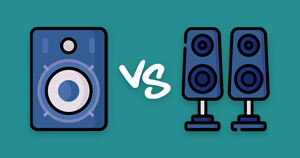Mastering is one of those things that to newer artists, is the world’s most profound mystery. You probably know that you’re meant to master your music, but what does that really mean? What is mastering and how is it going to realistically affect your music?
What Is Mastering?
Mastering is a process that prepares a song for distribution. A mastering engineer takes into account the destination format (CD, vinyl, streaming, etc.) and then proceeds to optimize playback of the song accordingly.
Mastering commonly includes the use of EQs, imagers, compressors, saturators, limiters, and meters. Some mastering engineers opt to create transparent masters (that sound as close to the pre-mastered version as possible), while others like to apply their own style via coloration and various other means.
Before and After Mastering
For a before and after comparison of mastering, I’ve included two versions of “RIP” by Torn. The first version is the unmastered mix. The second version is the master that I sent him for commercial release. If you like what you hear, you can submit your project for mastering!
What Will Mastering Do for My Music?
Before investing any time or money into mastering, it's important to understand the benefits that it provides. Mastering won't necessarily make your song a hit, but poor mastering can ruin the mix that you've worked hard on. A quality mastering engineer will be able to provide a service that does the following things for your song.
1. Make It Presentable for Consumers
Taking a step back from your music and allowing a third party (your mastering engineer) to tackle it with unbiased ears is going to bridge the gap between your vision as an artist, and the people listening to your music (the consumers). A mastering engineer's main job is to prepare music "for the people".
2. Ensure Proper Playback Across Various Devices
It's vital that your music plays back consistently across common devices. These devices include phones, computers, car speakers, and in the club! Keep in mind that most people aren't listening to music through $1000+ monitors. If your music sounds good on your monitors but falls apart on the devices that most people are using, you need a mastering engineer! Mastering engineers work in sound-treated spaces that provide a flat listening environment. Achieving a balanced master in a space like this helps ensure consistent playback across multiple devices in different listening environments.
3. Provide Clarity Enhancement
Although mastering won't fix a broken mix, it can provide enhancement to a good one. Assuming your mix is clean, mastering should help pull the track together and give it a sense of "togetherness". Devices like saturators, exciters, and expanders can target certain frequency ranges and give them more presence in the mix if necessary.
4. Achieve Loudness
Making your music loud is becoming less and less important with streaming services beginning to normalize tracks based off of LUFS (Loudness Units Full Scale), but it’s currently still a vital part of a mastering engineer’s job. This ultra-compressed sound has even become a fundamental building block for a lot of EDM. There’s a way to achieve this sound without destroying your track. It requires a “tight” mix and a carefully executed master.
It's Not Magic
A common misconception is that mastering is going to drastically improve your music. Your mix has to sound good if you want your master to sound great. Whether you’re recording, producing or mixing, you should never count on the next person in the production line to fix your mistakes. Mastering accentuates everything in your music, making the good parts sound great, and the bad parts sound terrible
If you don’t feel good about your song before sending it off to your mastering engineer, you're not going to like how your engineer sends it back to you. Mastering is the cherry on top of your milkshake; the finishing touch. It’s incredibly important as it adds that last bit of shine and professionalism. However, it’s not going to make a shit flavored milkshake taste good.
As a mastering engineer, I have a certain number of tools I can work with and their abilities are limited. I’ve definitely worked miracles on tracks before, but if you’re sending off the first song you’ve ever produced and expect it to come back sounding like an Excision track, I can almost guarantee you that it won’t. When you use the right mastering engineer, you should see an improvement, but we’re talking about the 5-10% range.
Want to learn how to master your own music? Check out Black Ghost Audio's Music Production for Beginners video course. Produce three songs from start to finish and learn the skills you need to write, record, mix, and master music at home. No experience required. Click here to learn more and produce your first song in under an hour.

















